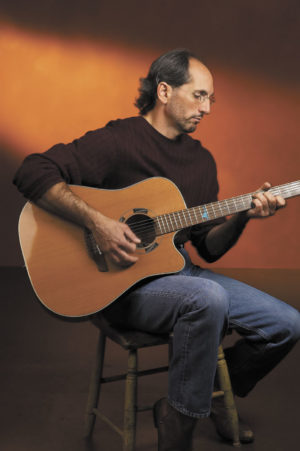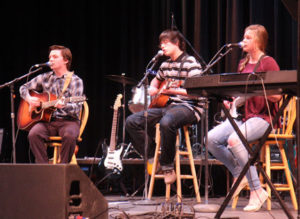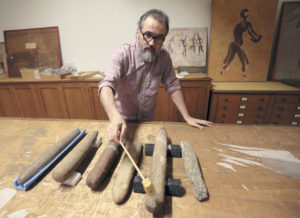By Martha Quillen
What a coincidence; the theme of this month’s magazine is music, and I’d been planning on writing about harmony for more than a year now. Of course, I hadn’t planned on writing about our local music scene, because I don’t know anything about it.
But I’d been reading about some of the ways various economists, psychologists, historians and journalists think we can address our political problems without undue discord. And I’d intended to share some of their ideas once the election was over. At this point, it seems as if the hubbub over the 2016 election may never subside.
This is clearly not a good time for harmonizing. In recent years, our world has been transformed by a seemingly limitless flow of information which provides enough material for people to compose whatever reality they want, and Americans clearly aren’t choosing the same one.
In previous Centrals, I devoted considerable space to fretting about people’s increasing tendency to embrace highly partisan, diametrically opposed views regarding news, issues, facts and even truth itself. A lot of critics blame social media for that trend, because users tend to form like-minded communities, but I’m not so sure about that.
I figure journalists, networks and websites are just as responsible, since they often rely on gossip, sensationalism and controversy to build their audience. And political campaigners certainly play a role, because they tend to get derailed by financing, and who’s with them and who’s not, and what’s wrong with their opponents.
And the tendency of public officials to focus on their own agenda – rather than on workable solutions for the voters – encourages gridlock, stasis, lies, corruption and anger.
So is our process oriented toward picking leaders? Or fights?
That’s hard to decide, but I thought tweets, Facebook posts, the internet, unreliable information and “fake news” were probably making things worse. And I concluded that people needed to stick with verifiable information and engage in more sober, serious discourse online and off.
And that probably wouldn’t hurt.
But then something happened that made Washington pundits sing my song. And you would think I’d be pleased. Instead, I realized how limited my presumptions were.
On December 4, Edgar Welch, a twenty-eight-year-old father of two from North Carolina, launched an attack on a pizzeria. Welch had been following online posts about a purported child sex ring led by Hillary Clinton, which was reputed to be operating out of Comet Ping Pong Pizza in Washington D.C., and he decided to do something about it. Welch drove several hundred miles north, arrived at the restaurant, and started shooting, but surrendered peaceably after finding no captive kids on the premises.
“I just wanted to do some good,” he told New York Times reporter Adam Goldman, a Pulitzer-prize winning journalist.
Despite Welch’s apparent remorse, he wasn’t convinced the online accusations he’d responded to were bogus. Instead, he told Goldman he regarded the designation “fake news” as something people use to discount stories generated outside of the mainstream media, which Welch doesn’t trust.
Although the majority of Americans would likely deem Welch incredibly reactive and more than slightly unhinged, recent events have shown that respectable polling companies can be equally wrong, and some of the most bizarre conspiracy theories – including one claiming Russia was hacking into American emails in order to make Donald Trump President – may be right.
[InContentAdTwo] Now fake news, unvetted Facebook posts, dubious tweets and people who disperse unverified materials are under fire. But it occurs to me that misinformation isn’t our primary problem. Hoaxes are as old as print, and were doubtlessly spread by word-of-mouth before papyrus was invented.
And untruths are not all equal. Many decades ago, I wrote a paper about famous American hoaxes for a journalism class, and it featured faux news by Edgar Allen Poe, Mark Twain and H.L. Mencken. One very elaborate deception was published in the New York Sun in 1835 as a series of articles said to be an account of the fabulous discoveries that Sir John Herschel was making with his new telescope. The Sun reported the moon was covered with great seas and canyons and trees and inhabited by furry-winged creatures four feet tall, which scientists had named Vespertilio-homo, or man-bats.
Add traveling medicine shows, P.T. Barnum, magic tricks, mystery cabins that seem to defy gravity, along with faked fossils, paintings and museum pieces and millions of splinters from the true cross, and one can only conclude that there’s never been a shortage of fakery.
People will believe incredible things if they trust the source. But people don’t just read crazy things and believe them. They agree with the crazy things they read because those things fit in with what they already think.
And that’s our overwhelming problem today. It’s not the internet or even the lies, it’s the tone and tenor of our times. Parties, campaigns, politicians, congressmen, think tanks, ordinary people, the media, websites, Facebook, Julian Assange, and even Russia are spreading fear, resentment, rancor, intentional distortions, cruel rumors and vicious speculation.
We are eating it up because we are primed to believe that things are going downhill. Maybe they are, but we have got to stop helping them slide.
Conservatives have to stop cheering on celebrities like Rush Limbaugh and Ann Coulter, who revel in name-calling, insults and scorn for minorities and the environment, and Democrats have to stop stereotyping their opponents as stupid, uneducated and unfit to participate.
Our political differences are making us suspicious and mean-spirited, and that’s just wrong. Even here in Salida, political dealings have grown increasingly tense. But our personal relations?
I find it astounding how kind, cordial and caring people have been to me. Being good and helpful neighbors is something an astounding number of Salidans believe in, regardless of their politics, and that, in my view, may be the most important policy citizens can adopt. For if history shows us anything, it’s that nations are as threatened by escalating anger and chaos within as they are by armies at the border.
Martha Quillen lives in Salida and usually sings off key, but refrains from doing it in public.




